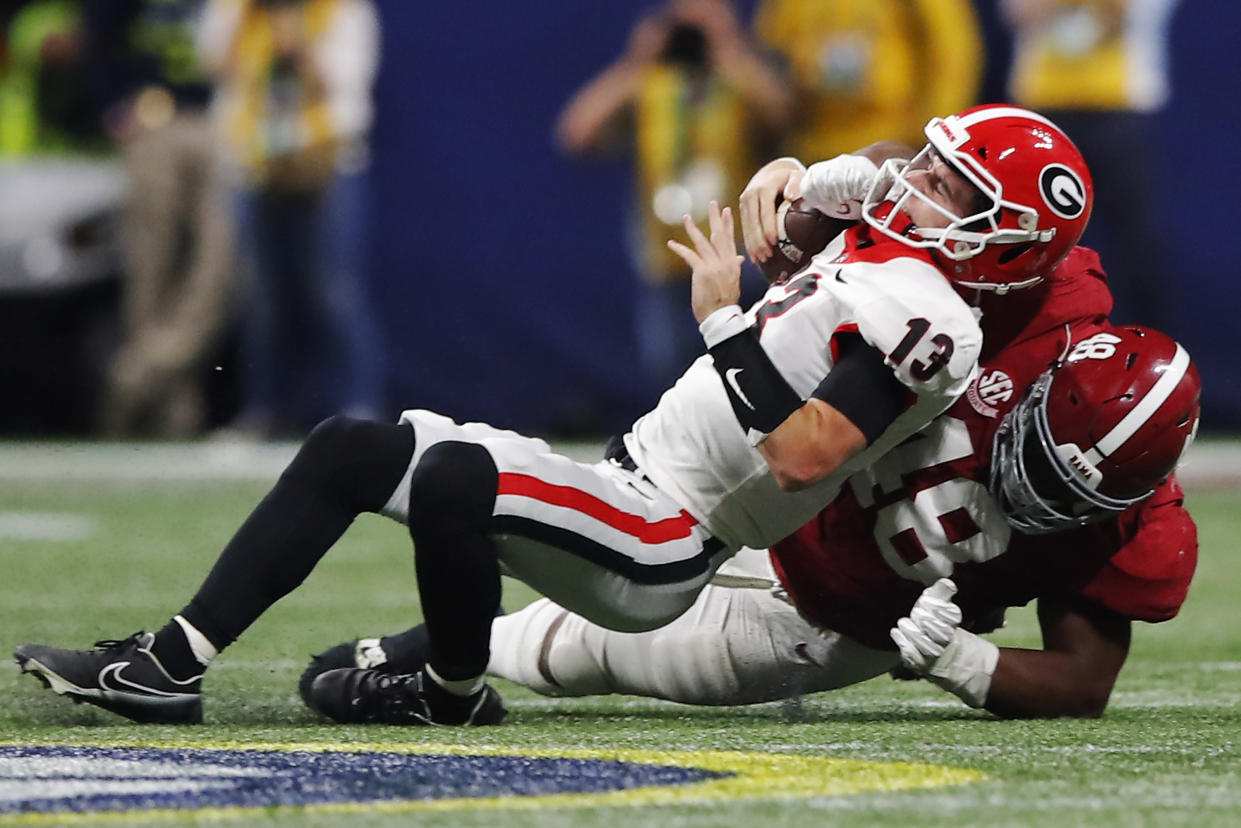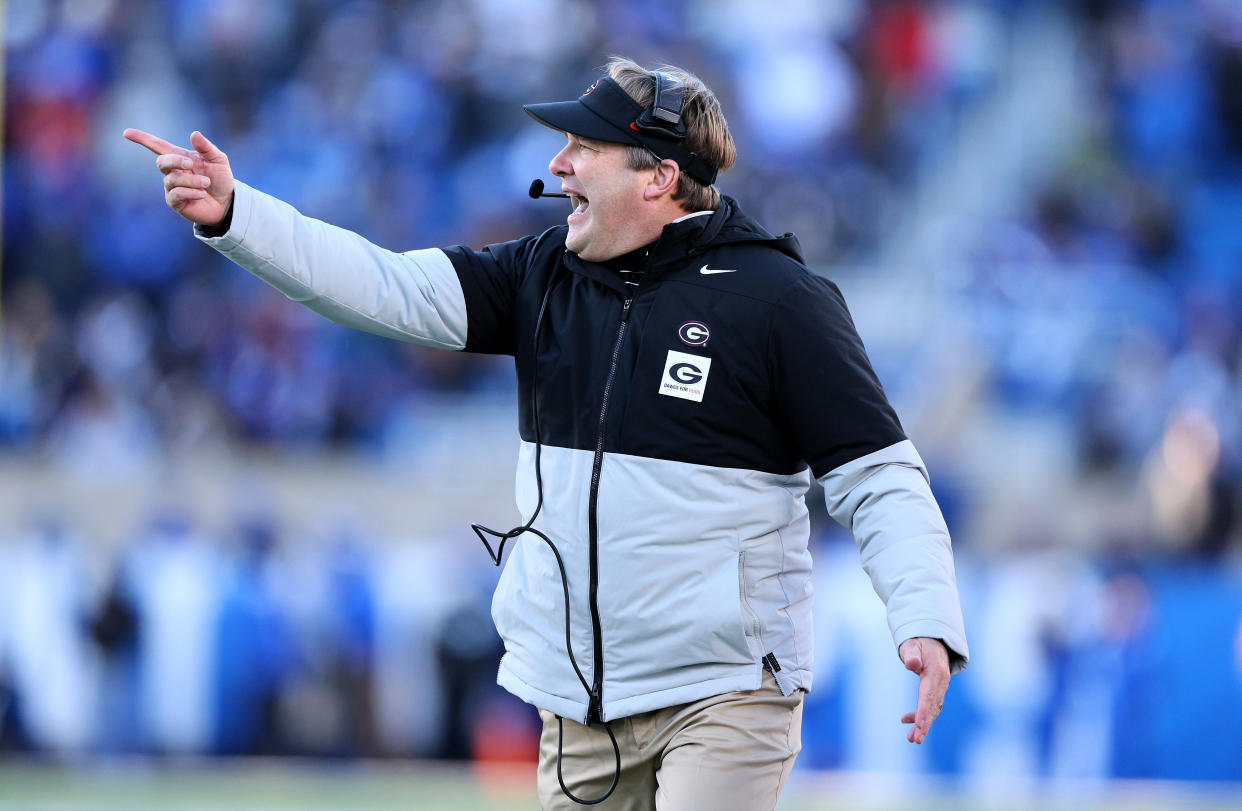College Football Playoff: What if Georgia loses?
Three plays. Georgia was just three plays away from ending a four-decade championship drought. Leading Alabama in overtime, with the Tide pinned 41 yards from the end zone on second down, the Bulldogs had to make just three more stops against a true freshman quarterback, and the national championship was theirs. Mercedes-Benz Stadium in Atlanta was rattling to its foundations, tension and anticipation ready to blow the roof off the still-new joint.
Dawgs fans remember all too well what happened next. On second-and-26, Tua Tagovailoa dropped back, spotted DeVonta Smith wide open on the left side of the field, and hit him for a perfect, game-ending, season-ending, hope-snuffing touchdown. The foundation of a new Georgia dynasty would have to wait another four years.
The Bulldogs rebounded, of course. Georgia fought its way back into the playoff using ferocious defense and opportunistic offense, and got its revenge on Alabama by pummeling the Tide in last season's title game. Still, second-and-26 lingers out there, a perpetual reminder that in college football, nothing is guaranteed.
Three years and 51 weeks after that crucial game, Georgia is back in the playoff, and this time the Dawgs are the overwhelming favorites. They’re favored to beat Ohio State in the Peach Bowl by almost a touchdown. They’d be favored against Michigan and heavily favored against TCU should the Horned Frogs reach the national championship. Everything is setting up nicely for Georgia to become the first repeat champion in the College Football Playoff era, and the path is clear for Georgia to establish itself as the preeminent college football dynasty of the 2020s.
So it may be impolite, it may be jarring, it may be disrespectful to even ask the question, but it’s necessary: What if Georgia loses?
What if Ohio State rediscovers its championship pedigree and knocks off Georgia on Saturday night, in the same building where Alabama worked the Dawgs over in 2018? What if Michigan shows it learned some crucial lessons from getting stomped by Georgia last postseason? What if TCU authors a feel-good, unlikely, Rudy-in-the-NIL-era underdog story? What happens to Georgia’s image, legacy and future then?
The simple, and most likely, answer is, not a damn thing. Kirby Smart has built a behemoth in Athens, a team so deep that the Dawgs’ backups could make a run in the SEC East. From high school recruiting to championship confetti, Smart has created an end-to-end monster that should be a playoff fixture for years to come.

And yet, this is right where things can get squirrelly. It's not all that long ago — about 355 days, give or take — that Georgia was thought of as an underachieving program, one that couldn't find the last pieces of the championship puzzle. SEC rivals Alabama, LSU, Auburn, Tennessee and Florida had all managed to win titles after Georgia's then-most-recent one, all the way back in the 1980 season. When the nerds at Georgia Tech were able to give Georgia grief for winning a more recent national championship, things were very much amiss in Athens.
Today, even with that natty in hand, Georgia fans need only look across the South Carolina border to see how even a tiny slip off the pace can derail a program’s dynastic aspirations. Clemson spent much of the College Football Playoff era threatening and thumping Alabama and Ohio State, and now finds itself out of the annual championship conversation. There’s a reason no team has repeated as national champions in this era: the playoff is a boiling crab pot, and any team that gets too high tends to get yanked back down again in a hurry.
Elsewhere in the SEC, head coaches at two recent national champions — Auburn and LSU — were out of work a whole lot faster than they would have anticipated when they were hoisting those championship trophies. There were extenuating circumstances in both cases, of course, but still, relying on the patience and goodwill of SEC boosters is not a formula for long-term job security.
(Plus, let’s not even raise the specter of Atlanta-area sports, which seem specifically designed to wreak the most havoc on their fans’ psyches and souls. Second-and-26 is no 28-3, but it’s in the same heartbreaking conversation.)
Consistency. Complacency. Legacy. Dynasty. A team seeking immortality must master the first two before it can begin thinking about the next two. Smart has solved the consistency issue; Georgia hasn’t lost a regular-season conference game since 2020, and hasn’t lost in Athens since 2019. He spent the first part of this season railing against the idea that his team would be complacent, and shut a whole lot of mouths when Georgia absolutely skull-dragged a heralded Tennessee team in the Dawgs’ biggest test of the season.
In all likelihood, this is a moot issue. Georgia simply has to play to its well-established, well-demonstrated abilities, and it will carve right through the playoff field the way it did through the SEC. The legacy will be secure, and Smart will be well on the way to building that dynasty.
Still, Georgia fans and players alike should keep in mind the enduring lesson of second-and-26: Even when everything seems spread out right there in front of you, there’s always someone looking to get behind you and wreck your world.

_____
Contact Jay Busbee at jay.busbee@yahoo.com or on Twitter at @jaybusbee.
